Fleurs du Mal Magazine


Or see the index
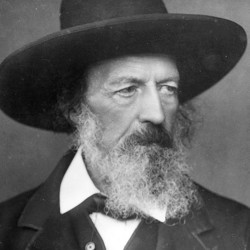
Ask me no more
Ask me no more: the moon may draw the sea;
The cloud may stoop from heaven and take the shape,
With fold to fold, of mountain or of cape;
But O too fond, when have I answer’d thee?
Ask me no more.
Ask me no more: what answer should I give?
I love not hollow cheek or faded eye:
Yet, O my friend, I will not have thee die!
Ask me no more, lest I should bid thee live;
Ask me no more.
Ask me no more: thy fate and mine are seal’d:
I strove against the stream and all in vain:
Let the great river take me to the main:
No more, dear love, for at a touch I yield;
Ask me no more.
Alfred Lord Tennyson
(1809-1892)
Ask me no more
• fleursdumal.nl magazine
More in: Archive S-T, Archive S-T, Tennyson, Alfred Lord
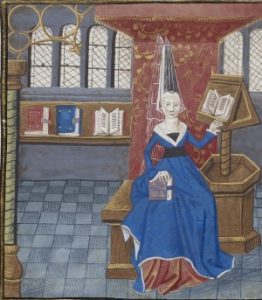
Comme surpris
Comme surpris
Et entrepris
De vostre amour,
Je me rens pris
En vo pourpris,
Dame d’onnour.
Si ne mespris
Quant j’entrepris
Si haulte honnour
Comme surpris.
Mais en despris
Ne m’ait le pris
De vo valour;
Car j’ay apris
Les biens compris
En vo doulçour
Comme surpris.
Christine de Pisan
(1364/1365 – 1430)
Comme surpris
Rondeaux
• fleursdumal.nl magazine
More in: # Classic Poetry Archive, Archive O-P, Archive O-P, Pisan, Christine de, The Ideal Woman
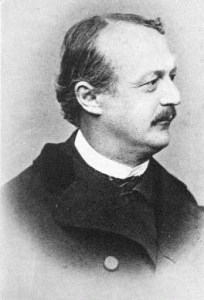
In der Sistina
In der Sistine dämmerhohem Raum,
Das Bibelbuch in seiner nerv’gen Hand,
Sitzt Michelangelo in wachem Traum,
Umhellt von einer kleinen Ampel Brand.
Laut spricht hinein er in die Mitternacht,
Als lauscht’ ein Gast ihm gegenüber hier,
Bald wie mit einer allgewalt’gen Macht,
Bald wieder wie mit seinesgleichen schier:
»Umfaßt, umgrenzt hab ich dich, ewig Sein,
Mit meinen großen Linien fünfmal dort!
Ich hüllte dich in lichte Mäntel ein
Und gab dir Leib, wie dieses Bibelwort.
Mit wehnden Haaren stürmst du feurigwild
Von Sonnen immer neuen Sonnen zu,
Für deinen Menschen bist in meinem Bild
Entgegenschwebend und barmherzig du!
So schuf ich dich mit meiner nicht’gen Kraft:
Damit ich nicht der größre Künstler sei,
Schaff mich – ich bin ein Knecht der Leidenschaft –
Nach deinem Bilde schaff mich rein und frei!
Den ersten Menschen formtest du aus Ton,
Ich werde schon von härterm Stoffe sein,
Da, Meister, brauchst du deinen Hammer schon,
Bildhauer Gott, schlag zu! Ich bin der Stein.«
Conrad Ferdinand Meyer
(1825 – 1898)
In der Sistina
• fleursdumal.nl magazine
More in: # Classic Poetry Archive, Archive M-N, Archive M-N
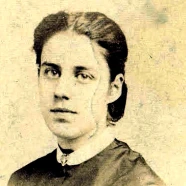
Age and Death
Come closer, kind, white, long-familiar friend,
Embrace me, fold me to thy broad, soft breast.
Life has grown strange and cold, but thou dost bend
Mild eyes of blessing wooing to my rest.
So often hast thou come, and from my side
So many hast thou lured, I only bide
Thy beck, to follow glad thy steps divine.
Thy world is peopled for me; this world’s bare.
Through all these years my couch thou didst prepare.
Thou art supreme Love—kiss me—I am thine!
Emma Lazarus
(1849 – 1887)
Age and Death
From: Selected Poems
• fleursdumal.nl magazine
More in: Archive K-L, Archive K-L, Lazarus, Emma
William Blake’s Universe
until 19 May 2024
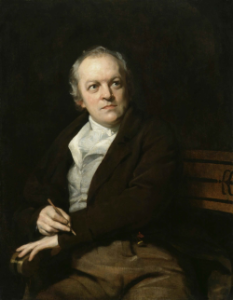 Discover William Blake’s universe and a constellation of European artists seeking spirituality in their lives and art in response to war, revolution and political turbulence.
Discover William Blake’s universe and a constellation of European artists seeking spirituality in their lives and art in response to war, revolution and political turbulence.
Sometimes seen as an eccentric figure or lone genius, William Blake’s Universe is the first exhibition to explore Blake’s boundless imagination in the context of wider trends and themes in European art including romanticism, mysticism and ideas of spiritual regeneration.
This timely new exhibition brings together the largest-ever display of works by the radical British artist, printmaker and poet from our own collection, alongside artworks by his European contemporaries such as the German romantic painters Philipp Otto Runge and Caspar David Friedrich – many of which have never been displayed publicly in the UK until now.
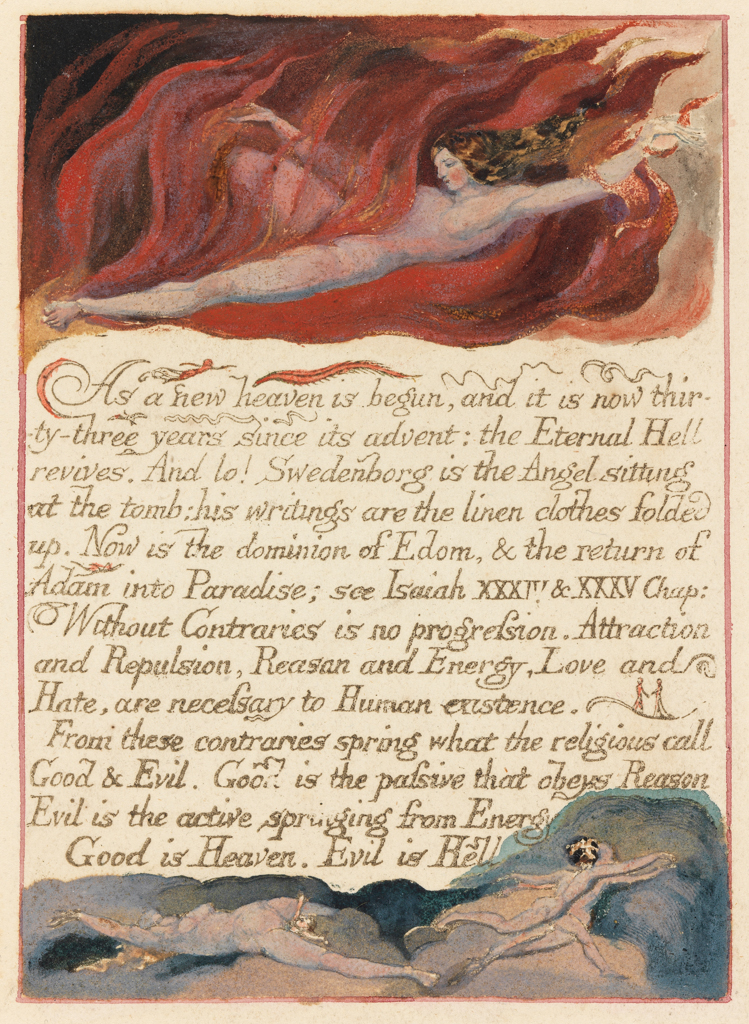
Though these artists never met or connected in their lifetimes, Blake, Runge and Friedrich shared a strong sense of individuality and an unwavering belief in the power of art to redeem a society in crisis.
William Blake’s Universe
until 19 May 2024
University of Cambridge Museums
The Fitzwilliam Museum
Trumpington Street
Cambridge
CB2 1RB
Tel: +44 (0)1223 333 230
Email: tickets@museums.cam.ac.uk
• fleursdumal.nl magazine
More in: Archive A-B, Archive A-B, Art & Literature News, Blake, William, Literary Events

Much Madness is divinest Sense
Much Madness is divinest Sense
To a discerning Eye –
Much Sense – the starkest Madness –
’Tis the Majority
In this, as all, prevail –
Assent – and you are sane –
Demur – you’re straightway dangerous –
And handled with a Chain –
Emily Dickinson
(1830-1886)
Much Madness is divinest Sense
• fleursdumal.nl magazine
More in: Archive C-D, Archive C-D, Dickinson, Emily

Song:
Sweetest love, I do not go
Sweetest love, I do not go,
For weariness of thee,
Nor in hope the world can show
A fitter love for me;
But since that I
Must die at last, ’tis best
To use myself in jest
Thus by feign’d deaths to die.
Yesternight the sun went hence,
And yet is here today;
He hath no desire nor sense,
Nor half so short a way:
Then fear not me,
But believe that I shall make
Speedier journeys, since I take
More wings and spurs than he.
O how feeble is man’s power,
That if good fortune fall,
Cannot add another hour,
Nor a lost hour recall!
But come bad chance,
And we join to’it our strength,
And we teach it art and length,
Itself o’er us to’advance.
When thou sigh’st, thou sigh’st not wind,
But sigh’st my soul away;
When thou weep’st, unkindly kind,
My life’s blood doth decay.
It cannot be
That thou lov’st me, as thou say’st,
If in thine my life thou waste,
That art the best of me.
Let not thy divining heart
Forethink me any ill;
Destiny may take thy part,
And may thy fears fulfil;
But think that we
Are but turn’d aside to sleep;
They who one another keep
Alive, ne’er parted be.
John Donne
(1572–1631)
Song: Sweetest love, I do not go
• fleursdumal.nl magazine
More in: Archive C-D, Archive C-D, Donne, John
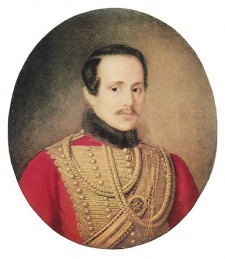
Mijn dolk
Ik sloot jou in mijn hart, mijn maat, mijn dolk,
Sinds jaar en dag mijn onderkoelde kameraad,
Gesmeed werd jij door vrijgevochten ruitervolk,
Geslepen door een christenhart vervuld van haat.
Door lelieblanke hand wist jij jouw heft omvat,
Als aandenken aan wat – aan wíe – ik achterliet,
In plaats van bloed vergleed er langs jouw blad
Een opgewelde traan – een parel van verdriet.
Haar rokerige ogen vast op mijn persoon gericht,
Vervuld van onbenoembaar, onuitspreekbaar leed,
Verschoten, vlamden dan weer op, in haar gezicht,
Zoals jouw kling dat in het laaiend kampvuur deed.
Zij maakte jou mijn metgezel, haar liefdespand,
De vagebond in mij volgt steeds jouw wijze raad,
Ja, trouw ben ik haar, ik doe mijn woord gestand,
En jij, jij houdt mij bij de les, mijn kille kameraad!
Michail Lermontov,
Mijn dolk, Кинжал (1838)
(1814 – 1841)
Vertaling Paul Bezembinder
Paul Bezembinder studeerde theoretische natuurkunde in Nijmegen. In zijn poëzie zoekt hij vooral in klassieke versvormen en thema’s naar de balans tussen serieuze poëzie, pastiche en smartlap. Bij uitgeverij Leeuwenhof (Oostburg) verschenen de bundels Gedichten (2020), Parkzicht (2020) en Duizelingen (2022). Website: www.paulbezembinder.nl
• fleursdumal.nl magazine
More in: - Archive Tombeau de la jeunesse, Archive A-B, Archive A-B, Archive K-L, Archive K-L, Bezembinder, Paul, Lermontov, Lermontov, Mikhail
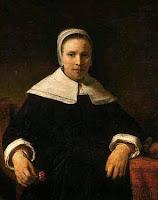
To My Dear and Loving Husband
If ever two were one, then surely we.
If ever man were loved by wife, then thee;
If ever wife was happy in a man,
Compare with me, ye women, if you can.
I prize thy love more than whole mines of gold,
Or all the riches that the East doth hold.
My love is such that rivers cannot quench,
Nor ought but love from thee give recompence.
Thy love is such I can no way repay;
The heavens reward thee manifold, I pray.
Then while we live, in love let’s so persever[e],
That when we live no more, we may live ever.
Anne Bradstreet
(1612 – 1672)
To My Dear and Loving Husband
• fleursdumal.nl magazine
More in: # Classic Poetry Archive, Archive A-B, Archive A-B, Bradstreet, Anne
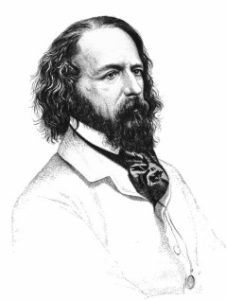
Marriage Morning
Light, so low upon earth,
You send a flash to the sun.
Here is the golden close of love,
All my wooing is done.
Oh, all the woods and the meadows,
Woods, where we hid from the wet,
Stiles where we stayed to be kind,
Meadows in which we met!
Light, so low in the vale
You flash and lighten afar,
For this is the golden morning of love,
And you are his morning star.
Flash, I am coming, I come,
By meadow and stile and wood,
Oh, lighten into my eyes and my heart,
Into my heart and my blood!
Heart, are you great enough
For a love that never tires?
O heart, are you great enough for love?
I have heard of thorns and briers.
Over the thorns and briers,
Over the meadows and stiles,
Over the world to the end of it
Flash of a million miles.
Alfred Lord Tennyson
(1809-1892)
Marriage Morning
• fleursdumal.nl magazine
More in: Archive S-T, Archive S-T, Tennyson, Alfred Lord
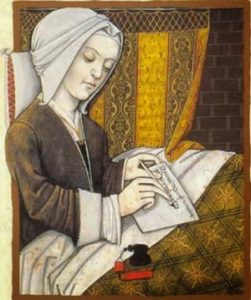
Belle, ce que j’ay requis
Belle, ce que j’ay requis
Or le vueilliez ottroier,
Car par tant de fois proier
Bien le doy avoir conquis.
Je l’ay ja si long temps quis,
Et pour trés bien emploier,
Belle, ce que j’ay requis.
Se de moy avez enquis,
Ne me devez pas noyer
Mon guerdon, ne mon loier;
Car par raison j’ai acquis,
Belle, ce que j’ay requis.
Christine de Pisan
(1364/1365 – 1430)
Belle, ce que j’ay requis
Rondeaux
• fleursdumal.nl magazine
More in: # Classic Poetry Archive, Archive O-P, Archive O-P, Pisan, Christine de, The Ideal Woman

Woman’s Constancy
Now thou has loved me one whole day,
Tomorrow when you leav’st, what wilt thou say?
Wilt thou then antedate some new-made vow?
Or say that now
We are not just those persons which we were?
Or, that oaths made in reverential fear
Of Love, and his wrath, any may forswear?
Or, as true deaths true marriages untie,
So lovers’ contracts, images of those,
Bind but till sleep, death’s image, them unloose?
Or, your own end to justify,
For having purposed change and falsehood, you
Can have no way but falsehood to be true?
Vain lunatic, against these ‘scapes I could
Dispute and conquer, if I would,
Which I abstain to do,
For by tomorrow, I may think so too.
John Donne
(1572–1631)
Woman’s Constancy
• fleursdumal.nl magazine
More in: Archive C-D, Archive C-D, Donne, John
Thank you for reading Fleurs du Mal - magazine for art & literature